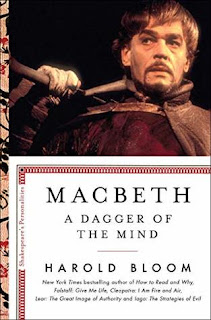Macbeth: A Dagger Of The Mind
Harold Bloom is one of our foremost literary scholars, and wrote one of the best books on Shakespeare I've ever read, The Invention Of The Human, which posits that the Bard was about three-hundred years ahead of Freud. As part of a series of five books on Shakespearean personalities, he has written Macbeth: A Dagger Of The Mind.
The book is very short and I read it in two sittings. Basically, it is a super-annotated version of the text. Bloom presents us with portions of the text (I think it may be all there) and then discusses it, giving us the meanings of certain words and expounding on what's going on. In some ways it's a high-toned version of Cliff's Notes. I say high-toned because you'll never see stuff like this in Cliff's Notes:
"Nietzsche asserts, in The Dawn of Day, that “whoever thinks that Shakespeare’s theatre has a moral effect, and that the sight of Macbeth irresistibly repels one from the evil of ambition, is in error. . . . He who is really possessed by raging ambition beholds this its image, with joy; and if the hero perishes by his passion this is precisely the sharpest spice in the hot draught of this joy.”
Bloom also is an engaging writer, who refers to his own experiences. When discussing the murder of Macduff's family, Bloom writes: "In this drama of surpassing cruelties, the slaughter of Lady Macduff and her children has a unique dreadfulness. It is marked by a pathos unbearably poignant. Shakespeare’s skill is so extraordinary, even for him, that we hear no false notes in this threnody...I am torn between admiring Shakespeare’s everliving art and wincing at its effect on me."
There are also references to the word usage. I have mentioned before the use of the words "milk" and "sleep," but Bloom notes that the word "time" is used 51 or 52 times (he contradicts himself--some editing here would have helped), the words "blood or bloody" forty-one times, and "strange" twenty times. He also notes that the Hecate scene may have been written by Thomas Middleton (it is almost always cut from productions).
Bloom can also be funny. "Long ago I remember characterizing the Macbeths as the happiest marriage in Shakespeare. That can seem a grim jest, yet it is veracious. Their passion for each other is absolute in every way, as much metaphysical as erotic. The lust for power fuses with mutual desire and enhances the turbulence of their ecstasy."
What most comes across is that this man, in his late eighties, who has read and taught and seen this play countless times, still has a passion for it. He closes the book thusly: "Something in us dies with Macbeth: call it ambition or the iniquity of an imagination that does not know how to stop. And yet, for all his negativity, Macbeth’s vitality survives in our hearts. We cannot love him, since we are not Shakespeare, but absorbing him heightens our sense of being."
The book is very short and I read it in two sittings. Basically, it is a super-annotated version of the text. Bloom presents us with portions of the text (I think it may be all there) and then discusses it, giving us the meanings of certain words and expounding on what's going on. In some ways it's a high-toned version of Cliff's Notes. I say high-toned because you'll never see stuff like this in Cliff's Notes:
"Nietzsche asserts, in The Dawn of Day, that “whoever thinks that Shakespeare’s theatre has a moral effect, and that the sight of Macbeth irresistibly repels one from the evil of ambition, is in error. . . . He who is really possessed by raging ambition beholds this its image, with joy; and if the hero perishes by his passion this is precisely the sharpest spice in the hot draught of this joy.”
Bloom also is an engaging writer, who refers to his own experiences. When discussing the murder of Macduff's family, Bloom writes: "In this drama of surpassing cruelties, the slaughter of Lady Macduff and her children has a unique dreadfulness. It is marked by a pathos unbearably poignant. Shakespeare’s skill is so extraordinary, even for him, that we hear no false notes in this threnody...I am torn between admiring Shakespeare’s everliving art and wincing at its effect on me."
There are also references to the word usage. I have mentioned before the use of the words "milk" and "sleep," but Bloom notes that the word "time" is used 51 or 52 times (he contradicts himself--some editing here would have helped), the words "blood or bloody" forty-one times, and "strange" twenty times. He also notes that the Hecate scene may have been written by Thomas Middleton (it is almost always cut from productions).
Bloom can also be funny. "Long ago I remember characterizing the Macbeths as the happiest marriage in Shakespeare. That can seem a grim jest, yet it is veracious. Their passion for each other is absolute in every way, as much metaphysical as erotic. The lust for power fuses with mutual desire and enhances the turbulence of their ecstasy."
What most comes across is that this man, in his late eighties, who has read and taught and seen this play countless times, still has a passion for it. He closes the book thusly: "Something in us dies with Macbeth: call it ambition or the iniquity of an imagination that does not know how to stop. And yet, for all his negativity, Macbeth’s vitality survives in our hearts. We cannot love him, since we are not Shakespeare, but absorbing him heightens our sense of being."



Comments
Post a Comment